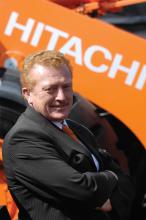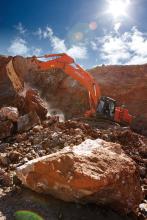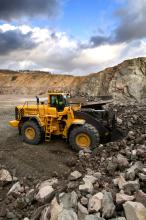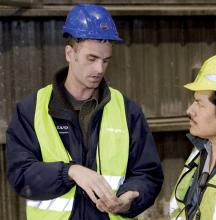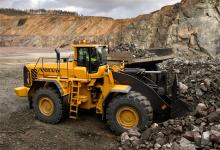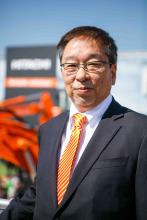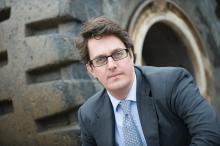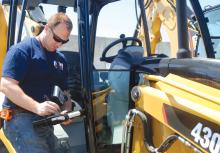
Since its split with
Strengthening strategic dealer networks is a key part of
According to Hitachi product sales representative for heavy and mining equipment Peter van der Staaij, the new strategy has been developed to match the consolidation in the quarrying sector. "Larger customers such as those in the aggregates business often operate across numerous countries in Europe but have central buying operations. Through our key account approach these customers will be able to go directly to one contact to organise buying new equipment," explained van der Staaijj.
"Our key account manager will then contact the most appropriately placed dealer, in terms of location and after sales service, to arrange the sale and delivery of the machine. This process will help to harmonise pricing for larger customers as well as to standardise specification of their machines."
Aiming high
The new strategy is part of Hitachi's ambition to retain its position as the top equipment supplier to the European quarrying industry. "We are aiming to maintain the number one position in Europe," said van der Staaij. "At the moment we are first in Europe for quarry sized excavators with around 35% market share in the 50 to 85tonne excavator range." The company is also working on expanding its markets through new dealer networks. Hitachi used to have an alliance with Fiat for sales, but since 2003 the company has managed its own dealer network.
According to van der Staaij, this change in focus has helped to boost the company's position in Western Europe and sales in Eastern Europe are also now growing. "We are working on building our dealer network in Eastern Europe and are expecting further growth from this region," he said.
Quarrying and mining is a key market for Hitachi and van der Staaij is one of a team of four who oversee this sector in Europe. The team is headed by Eric Green and also counts Hans van Vuren, Malcolm Edwards and Keisuke Okuzumi. "The region is split geographically," explained van der Staaij. "I am responsible for Holland, Belgium, Germany and Eastern European countries." Van der Staaij joined the mining and heavy equipment team in January last year but his experience with Hitachi means he is well placed to help customers in this sector. He first joined Hitachi's operations in Oosterhout in 1990 during the school holidays and later joined the company as a full time employee in 1995. Since then he has worked in domestic and exports parts, with the domestic dealers and international sales for mining as well as being a product specialist for demolition and then cranes.
Speaking about his current role, van der Staaij said, "I am really enjoying visiting the job sites and getting to know our customers. The challenge of building the business in Eastern Europe is also very interesting."
Product line
Hitachi offers a comprehensive excavator product line for both the construction and quarrying market with 1 tonne mini machines right up to 780tonne-plus mining models. But it is in the quarrying bracket - 30 to 110tonnes - that Hitachi has recently strengthened its range with the launch of the R specification machines.
"The R spec machines are the same as the standard machines but have more strongly reinforced booms, arms and side frames," said van der Staaij. "Due to the high strains placed on quarry machines, some operators had experienced problems with the structural integrity over time. We started to launch the R spec to match the design to the job about two years ago and the development was the direct result of feedback from customers. The cost of the R spec machines is higher than a standard machine but feedback so far suggests that the design significantly improves on site availability." Hitachi also has a large range of rigid dump trucks available for the European market to offer payloads from 59 to 286tonnes.
"Our wheeled loader range is not wide enough at the moment and it will be extended in the near future," said van der Staaij. "Initially the new models will fill out the lower part of the range, so will be aimed more at the construction market." Nonetheless, quarry sized machines are being planned by Hitachi and are likely to be introduced in line with the next change in engine emissions for the 130 to 560kW powerband in 2011.
Articulated dump trucks are Hitachi's other limitation but van der Staaij points to the company's agreement with
Machine supply
Like most manufacturers, meeting the demand for new machines is a challenge but van der Staaij said that Hitachi is able to supply machines to the quarrying sector within three months. "We supplied 225 excavators in the 50 to 80tonne weight class to the European market in 2007/2008 financial year, and all were delivered within three months of the order," he said.
Hitachi's excavators are all manufactured in Japan and shipped un-assembled to the company's port facilities in Amsterdam located close to its headquarters. The company aims to hold some unallocated stock at the dock to ensure it can meet any urgent orders quickly and cope with sudden surges in demand.
"Around 90% of the excavators sold into Europe arrive at the docks here in Amsterdam and are then taken to the dealers by ship or road, depending on the location, for assembly," said van der Staaij. "All the optional extras are fitted by the dealers during the assembly process." Hitachi's wheeled loaders are produced in Genas, France, while the rigid dump trucks are manufactured in both Canada and Japan and, like the excavators, shipped to Amsterdam before onward delivery.
Availability demand
Although van der Staaij has only been in his current role for 18 months, he is already noticing a trend emerging from the quarrying industry. "The consolidation of the quarrying industry in Europe is creating a number of key clients for us," he said. "While the regions they operate in and the way they operate is different, one thing that is similar across the board is the desire to minimise risks and pass these to the supplier.
"Having a good dealer network is essential to be able to achieve this and can be a challenge given the remote locations of some quarries. Nonetheless, the network we have in Western Europe will help and we are working to develop a similar network in Eastern Europe by not pushing the products into the market ahead of the support network."

